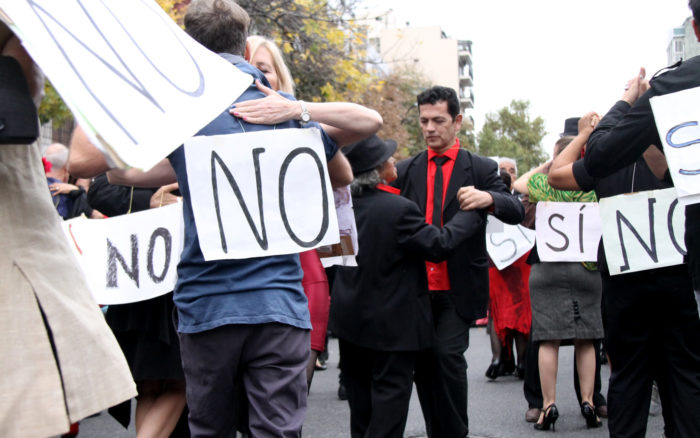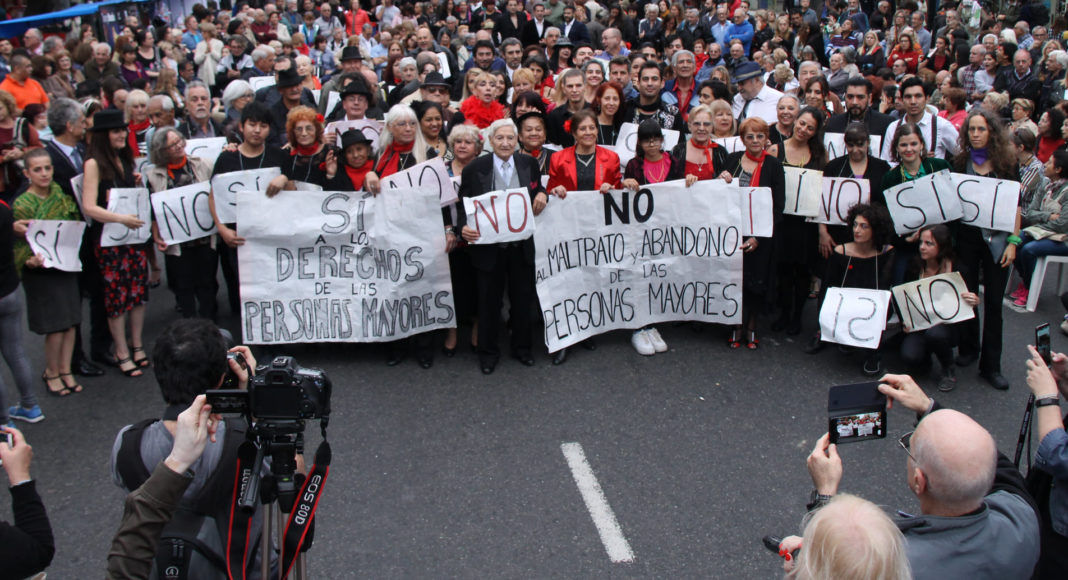Queer Tango teacher and LGBTQ+ activist Edgardo Fernández Sesma has advocated for social inclusion and sexual and gender diversity for almost thirty years. His dancers are renowned for their solidarity campaigns, striking public protests and flash mobs.
Today, Argentina’s lockdown measures, among the strictest in Latin America, have caused the dancers to evacuate the streets of Buenos Aires and move online.
Edgardo tells LAB’s Nina Meghji about navigating the digital space, the impact of lockdown on Buenos Aires’ elder residents, and the economic implications for the city’s tango community post Covid-19.
The quarantine in Argentina started on March 10, 2020. In general, the measures have been effective. At least, they seem to have resulted in few deaths and have not saturated the health system. Personally it’s been difficult – over five months without working, except for the odd online class, while racking up debts and waiting for the quarantine to end so I can go out and work again. On the other hand, I’ve used the time to take part in some much needed social movements.
Social media has been much more important than before the quarantine – I’ve been able to get in touch with a lot of people I’d stopped seeing. Being able to stay connected virtually has been a great source of support to a lot of people. I’ve tried to circulate the campaigns on social media – Facebook, Instagram, WhatsApp, Twitter, via email. I’ve been much more direct than before and capitalised on people having much more time to learn about things and reflect.

The suspension of our drop-ins [held at the Sociedad de Integración Gay Lésbica Argentina (SIGLA) in Buenos Aires] has been really sad for older people, especially for those who live by themselves. A total of around 150 people come to the drop-ins (not all of them every time). Of those 150, about 30 of them have fallen into more or less serious states of depression, nearly all of them women over 80 who live alone.
To combat this, I came up with a system of daily support over the phone. These people don’t have internet and some of them live in vulnerable places. They have told me that the support system has been a source of great help in the face of these lonely and despairing situations. I’ve been in touch with all 150 of the people from the drop-ins pretty regularly but with those 30 most in need, I’ve spoken to them daily.
Countering abuse
The anti-abuse campaigns [which championed the prevention and protection of elders against neglect and maltreatment] were born out of the situations lived by many people who went to events at the former ESMA 1)ESMA was the notorious torture centre at the Naval Mechanics’ School during the ‘Dirty War’, 1976-83. It has now become a museum, the Space for Memory and for the Promotion and Defense of Human Rights.. Many of them told me about their loneliness and feeling of being abandoned, as well as the experience of violence in care homes, which is still not a criminal offence. I wanted to bring people’s attention to this and for people to reflect on [the situation in] the homes, by dancing. This year we couldn’t dance in the street so I realised it would be really useful to take the campaign online.
Older people need some motivation to do things during this quarantine and this was a reason for many of them to make posters, take photos with their children or grandchildren and learn to connect and look at the campaigns. In that sense, this campaign turned out even better than in normal [pre-Covid] times – the majority of the central figures were helping themselves.
Helping trans-gender people
We are still publicising the murders of transgender people, which have decreased since 2016. And it gives us the opportunity to help trans women in vulnerable situations, and to find jobs for them so they can stop turning to sex work, which is one of the risks to which they are exposed. A few places, including Buenos Aires province, have approved work quotas for trans people. That’s almost unique in the world and we should continue with this.
Recently in Neuquén the government built and opened a small residential building for older trans people, for the most vulnerable. While they’re living there – in really beautiful lodgings – they don’t pay rent and when they leave, their place is assigned to another older trans person in need. It’s the only project of its kind in the world. Older trans people are the most vulnerable of all – the present generation are at university and college and manage to find jobs, although it takes a lot of effort. The government should carry on with its social awareness campaigns in schools, colleges and in public administration.
Strengthening social bonds
Some of the positive changes [since lockdown] have to do with creating stronger social bonds among older people, for example, and getting them to start gathering and providing company for each other in many cases. And regarding disseminating the campaigns, it’s been positive that people who had more free time could help spread the word better than they could before.
The biggest worry is to ensure that our jobs, both professional and social, survive the pandemic. We’re not sure if our tango club El Despelote Tango, along with many others, will survive. The venues where the classes and meet-ups take place are facing a very difficult situation.
Tango in general will recover after a while but the cost in the meantime is, and will be, enormous for the people who work in the sector, myself among them. We’ll have to bounce back from this period of not being able to work, start again from scratch and hope that the country’s economic situation improves so that people start returning to the dance clubs, classes and meet-ups.
Interview by Nina Meghji
Translation by Dominic Power
Edgardo features in LAB’s book Voices of Latin America
References
| ↑1 | ESMA was the notorious torture centre at the Naval Mechanics’ School during the ‘Dirty War’, 1976-83. It has now become a museum, the Space for Memory and for the Promotion and Defense of Human Rights. |
|---|

